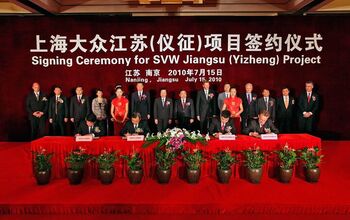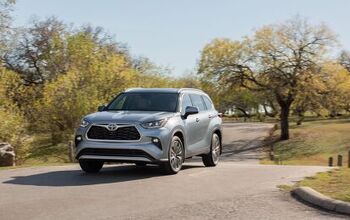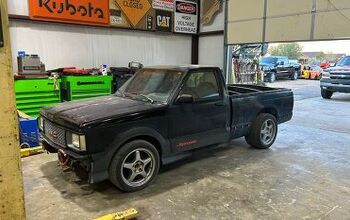China: Too Many Car Factories, Not Enough Buyers

China’s People’s Daily, the newspaper owned by the (alleged) communist party, carries a sobering analysis of the state of the Chinese auto industry. It is not that it will crash in to oblivion as some predicted. But it will not grow as fast as automakers build factories. Serious overcapacity and possibly the long predicted shakeout of China’s chaotic auto industry will be the likely result:
“China’s automotive market has suddenly entered an adjustment period and almost all the automotive enterprises of China were caught unprepared. Since April 2011, the automotive output and sales volume have both been declining for three successive months.
The mid-year performance of most auto enterprises has been lackluster in 2011, and about 70 percent of China’s carmakers had not reached half of their goals by the middle of 2011. Enterprises had hoped that sales would pick up during the month of October, but because the energy-saving automobile subsidy policies was adjusted to remove more than 90 percent of brands from eligibility, and therefore the under-1.6L automotive types did not turned into the vanguard of the momentum once again. The Golden Week 2011 turned out to be the most depressed Golden Week in history.”
This does not keep automakers from building new factories at a rapid clip. Investment decisions take time to formulate and to implement. Several manufacturers had been capacity constrained and decided to build. Once these factories come on line, capacity constraint will turn into a capacity glut. Says People’s Daily:
“Despite the slowdown in demand growth, domestic carmakers are still actively increasing their production capacity. With a total investment of 7.7 billion yuan, FAW-Volkswagen’s third plant has started operations in Chengdu. Shanghai GM has laid the cornerstone for a 7-billion-yuan project that will increase its annual production capacity by 300,000 vehicles.
The Changan PSA Automobile Company in Shenzhen has received government approval, and is expected to manufacture 500,000 vehicles a year. DPCA has started construction on its third plant in Wuhan, which will lift the automaker’s annual production capacity to 750,000 vehicles by 2015. In addition, Beijing Hyundai Motor Company, Changan Ford Mazda Automobile, which is Ford’s joint venture in China, and Jiangling Motors Company are also building new plants. According to statistics from the National Development and Reform Commission, the total annual output of China‘s 30 major carmakers will reach over 31.2 million vehicles by 2015. “
Chen Bin, director of the Industry Coordination Department of the National Development and Reform Commission, warns that “serious overproduction will lead to a series of issues, such as cutthroat competition in the auto market, a decline in the profits of auto enterprises and the idleness of production capacity.”
In a way, this situation will only strengthen the hands of foreign joint venture partners. The market share of Chinese homegrown brands, previously about half of the total, has been shrinking steadily over the year and recently went into a nosedive. In September, the market share of Chinese home-branded cars has dropped to an all-time low of 27.12 percent in September, down from 34.12 percent at the end of last year, data of the China Association of Automobile Manufacturers (CAAM) shows. What little growth there is is on the side of the joint venture brands. The joint ventures are typically aligned with large state owned enterprises. If push comes to shove, the Chinese government will look out for its own companies, and therefore by default for foreign joint venturers.

Bertel Schmitt comes back to journalism after taking a 35 year break in advertising and marketing. He ran and owned advertising agencies in Duesseldorf, Germany, and New York City. Volkswagen A.G. was Bertel's most important corporate account. Schmitt's advertising and marketing career touched many corners of the industry with a special focus on automotive products and services. Since 2004, he lives in Japan and China with his wife <a href="http://www.tomokoandbertel.com"> Tomoko </a>. Bertel Schmitt is a founding board member of the <a href="http://www.offshoresuperseries.com"> Offshore Super Series </a>, an American offshore powerboat racing organization. He is co-owner of the racing team Typhoon.
More by Bertel Schmitt
Latest Car Reviews
Read moreLatest Product Reviews
Read moreRecent Comments
- Akila Hello Everyone, I found your blog very informative. If you want to know more about [url=
- Michael Gallagher I agree to a certain extent but I go back to the car SUV transition. People began to buy SUVs because they were supposedly safer because of their larger size when pitted against a regular car. As more SUVs crowded the road that safety advantage began to dwindle as it became more likely to hit an equally sized SUV. Now there is no safety advantage at all.
- Probert The new EV9 is even bigger - a true monument of a personal transportation device. Not my thing, but credit where credit is due - impressive. The interior is bigger than my house and much nicer with 2 rows of lounge seats and 3rd for the plebes. 0-60 in 4.5 seconds, around 300miles of range, and an e-mpg of 80 (90 for the 2wd). What a world.
- Ajla "Like showroom" is a lame description but he seems negotiable on the price and at least from what the two pictures show I've dealt with worse. But, I'm not interested in something with the Devil's configuration.
- Tassos Jong-iL I really like the C-Class, it reminds me of some trips to Russia to visit Dear Friend VladdyPoo.

































Comments
Join the conversation
Is slowly turning into a too many Chiefs and not enuf syndrome. Buying Saab looks like a good idea now, will it be as good in 12 mths from now?